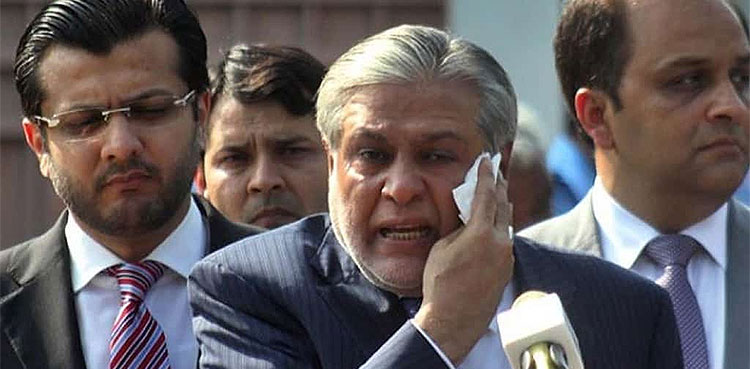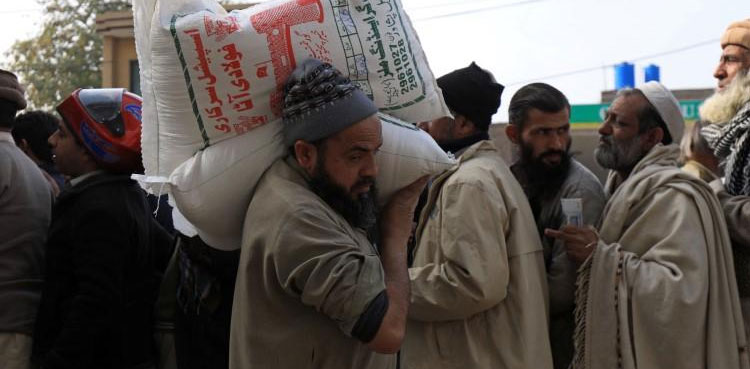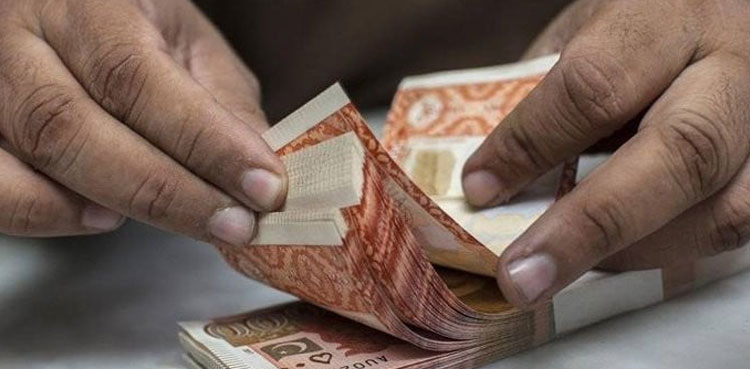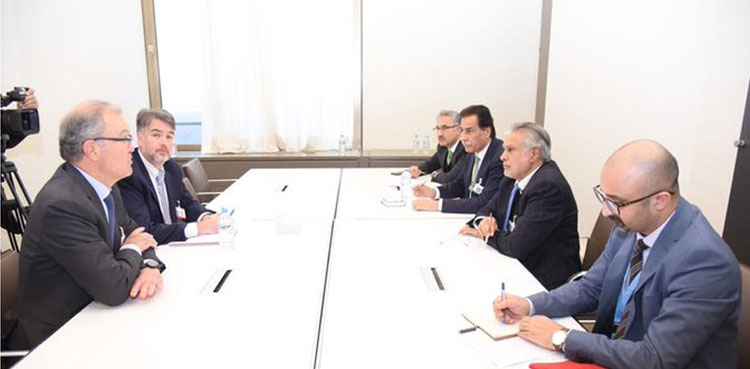Amid Pakistan’s historic economic crisis, this week, the rupee unexpectedly rallied and, at one point gained Rs.16 to the US dollar but this recovery does not appear to make much impact on the gloomy economic climate.
Then there is the perennial issue of the gap in the rupee-dollar exchange rate between interbank and open markets that led the IMF to goad the government to focus on restoration of proper foreign exchange market functioning.
It was also mentioned that the significant correction in the open market became possible after the State Bank of Pakistan (SBP) allowed commercial banks to purchase dollars from the interbank market to settle international payments made through credit cards by their clients.

However, the possibilities of improvement is the economic situation is gradually getting limited as is borne out by the desperation of the incumbent financial team that was at pains to explain that it has no backup plan except to remain associated with the IMF though the international financier appears rather unwilling to extend financial assistance to Pakistan in the prevailing circumstances implying thereby that Pakistani planners have lost all credibility in its eyes and it plans reconsidering its policies towards the country.
The Pakistani financial planners are trying to build their case around the fact that the IMF did not accept the external financing gap of $4.5 billion assessed by Pakistan and is sticking to its projection of a financing gap of $6 billion for the ongoing financial year.
The assurances given by Pakistan in this respect to the IMF are required for multilateral as well as bilateral creditors. It is reported that the coalition government has shared the budgetary framework for the next fiscal year to satisfy the IMF but it appears that the financial donor is clearly hesitant about signing the Staff Level Agreement (SLA) that may ultimately pave the way for the case of Pakistan to be put before the IMF board for final approval.
Interestingly, the sharing of budgetary numbers is not the part of 9th review as it will be part of the 10th review but the Prime Minister has taken the decision to share the numbers for the revival of the Fund programme.

Till it is done Pakistani policy makers will be on tenterhooks and the economic indicators will keep on going down.
The ongoing IMF programme is going to expire on 30 June, 2023 so the time is limited for completion of the pending 9th review under the $6.5 billion Extended Fund Facility (EFF). If the staff-level agreement strikes by evolving broader consensus on three contentious issues including external financing, budgetary framework and sticking to the free market exchange rate then the programme will be revived otherwise it will be met with failure.
However, the sources said that Pakistan would be left with no other option but to seek another IMF programme next fiscal year keeping in view debt external repayments of $25 billion. It does not include the current account deficit (CAD) and if it is projected in the range of $7-$8 billion for next fiscal year then the total external financing requirements will be stretched up to $32-$33 billion in 2023-24.
The financial planners of the coalition government have belatedly started to concede that there exists a trust deficit though they shift the blame of this difficulty to the previous PTI-regime for breaching the IMF agreement by doling out un-targeted fuel and electricity subsidies just before leaving the government in the last financial year.
They dutifully repeat that the Kingdom of Saudi Arabia had granted assurances of $2 billion in additional deposits and $1 billion from the United Arab Emirates along with the World Bank committing $450 million through the RISE-II program loan and $250 million through Asian Infrastructure Investment Bank (AIIB).
They point out that the remaining finances are expected through Geneva pledges in the aftermath of flood assistance and that this amounted to $4.5 billion that they considered was satisfactory an amount for the IMF to go ahead with finalising its agreement.

They also point out paying back $3 billion to commercial banks with the understanding that it would get re-financed these loans once the SLA is done.
It is however widely believed now that there was nothing concrete or certain about the revival of the IMF programme.
On the other front, the economic planners are also hard-pressed about the revenue collection as reports are coming in that the tax collection has fallen below the target by a substantial margin.
Also Read: The cost of political instability
The reported shortfall in tax collection target is tremendous as it stands at a record-breaking Rs.433 billion during the first 11 months of the current fiscal year putting the FBR in almost impossible position as it now faces the extremely daunting task of collecting a whopping Rs.1.43 trillion in June alone to meet the annual target.
FBR has fallen way behind the given collection target for eleven months amounting to Rs.6.64 trillion and could manage to collect Rs.6.2 trillion.
The revenue collection of Rs.6.2 trillion during the current fiscal year is Rs.836 billion higher than the corresponding period of the previous fiscal year, representing a growth rate of only 15.5%. This pace of increase is less than half of the nominal GDP growth rate of 36 per cent.
The result is that despite bringing in a supplementary budget and a record-breaking 36.4% inflation rate the coalition government is set to miss the annual tax collection target of Rs.7.640 trillion by a considerable margin.
It is reported that in May, the FBR failed to achieve its monthly collection target of Rs.621 billion falling short by Rs.54 billion and ending the month with a collection of Rs.567 billion with the monthly growth rate in collection standing at 14.5%.

To achieve the annual target of Rs.7.640 trillion the FBR now needs to collect an additional Rs.1.44 trillion in June requiring an average daily collection rate of Rs.48 billion.
The shortfall in tax collection for the current fiscal year will have adverse consequences for the proposed revenue target of Rs.9.2 trillion for the next fiscal year. The target might be further revised upwards if Pakistan follows the recommendations of the IMF.
It is very worrying for the policy makers to see that the tax collecting machinery could not achieve its collection target despite bringing in a mini-budget of Rs.170 billion increasing the heavy burden of indirect taxation on the people.
Moreover, the FBR had assured the IMF that rupee depreciation would net in an additional Rs.180 billion but that also failed to materialise owing to sharp drop in imports.
The laxity of the tax collecting machinery becomes woefully glaring in view of the fact that during the current fiscal year the coalition government im posed nearly Rs.800 billion in additional taxes.
Despite increasing the standard GST rate to 18% and raising the rate to 25% on numerous goods, the inefficient and cumbersome tax machinery has failed to collect the due revenue. It was reported that the overall collection of customs duty remained below the target for the 11th consecutive month with the FBR collecting Rs.828 billion during the July-May period.
This amount was Rs.62 billion less than the collection for the same period last year simply because the coalition government has restricted imports to preserve foreign exchange reserves. The decrease in imports has exposed the vulnerabilities in the FBR’s revenue collection methods bringing to fore the abject requirement of broadening the tax base, re-orienting the taxation machinery and cleaning its Augean stables.









